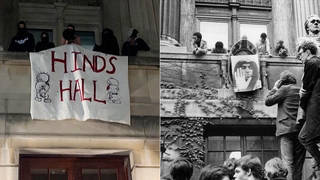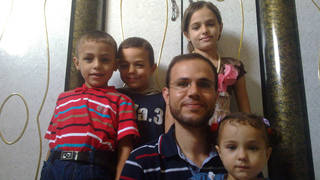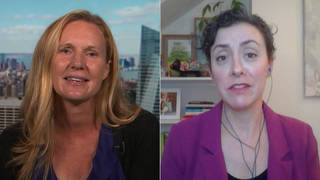
Related
Guests
- Laurie Kanyokformer patient and survivor of former Columbia University obstetrician Robert Hadden.
- Laura Beiljournalist and co-author of ProPublica’s Robert Hadden investigation.
- Bianca FortisAbrams reporting fellow and co-author of ProPublica’s Robert Hadden investigation.
We look at how Columbia University ignored women, undermined prosecutors and protected obstetrician Robert Hadden while he preyed on hundreds of his patients for more than two decades, as detailed in a new investigation from ProPublica and New York magazine. Hadden was sentenced in July to 20 years in federal prison for sexually abusing his patients, but survivors say no one has been held accountable at Columbia, and are still demanding justice. We speak with a survivor who reported Hadden to police after he assaulted her during a supposedly routine pregnancy exam in 2012, leading to his arrest, but Columbia allowed him to go back to work, and he assaulted more women. We are also joined by Laura Beil and Bianca Fortis, who co-wrote the new report. Beil also hosts the podcast Exposed: Cover-Up at Columbia University.
Transcript
AMY GOODMAN: This is Democracy Now!, democracynow.org, The War and Peace Report. I’m Amy Goodman, with Juan González.
A warning to our viewers and listeners: This story includes graphic descriptions of sexual assault.
We spend the rest of the hour looking at “How Columbia University Ignored Women, Undermined Prosecutors and Protected a Predator for More Than 20 Years.” That’s the headline of a damning new investigation by ProPublica and New York magazine. It lays out how Columbia University shielded obstetrician Robert Hadden for more than two decades. More than 245 patients have now alleged Hadden abused them.
In July, we spoke with two of Hadden’s former patients after he was sentenced to 20 years in federal prison. This new report details how Columbia often undermined the process of bringing him to justice in order to protect its reputation instead of acting in the victims’ interests.
Today we’ll be joined by Laurie Kanyok, a former patient of Hadden, a professional dancer, who survived his assault in 2012, even called 911, which led to his arrest. But Columbia allowed him back to work the next week, after he was arrested in his office. We’ll also speak with the two ProPublica journalists.
Their report begins with Laurie Kanyok. She was a 38-year-old professional dancer who sought the care of Hadden because of his association with the prestigious Columbia University. At first Laurie dismissed Hadden’s strange behavior while she was pregnant. But after she gave birth and saw him for a postpartum appointment in 2012, he assaulted her in a way she suspected he had also done in past exams. As she laid on the examining table, her legs in stirrups licked her vagina. She texted her boyfriend immediately, who paid a cab driver $50 to rush a few blocks to pick her up, then called 911 twice — first on the drive back to their apartment, then when they were home. This is part of his conversation with the 911 operator.
911 OPERATOR: 911 operator 1520. Where’s your emergency?
LAURIE KANYOK’S BOYFRIEND: My fiancée was at her OB-GYN.
911 OPERATOR: Uh-huh.
LAURIE KANYOK’S BOYFRIEND: And he basically did something inappropriate to her. So…
911 OPERATOR: OK. Did he —
LAURIE KANYOK’S BOYFRIEND: I just went up there and took her from there and brought her home.
911 OPERATOR: Did he harass her, sir?
LAURIE KANYOK’S BOYFRIEND: No, he basically touched her orally.
911 OPERATOR: OK. How long ago did this happen?
LAURIE KANYOK’S BOYFRIEND: It’s been now about a half an hour to 40 minutes.
911 OPERATOR: OK.
AMY GOODMAN: Once home, two police officers came to take Laurie’s statement. As they did, Dr. Hadden called her cellphone. This is the voicemail he left.
DR. ROBERT HADDEN: Yeah, hi, Laurie, it’s Dr. Hadden calling. It’s like 4:30 on Friday. You know, I just got word that you called the office, and you’re upset, and that you were calling the police? What — what the heck happened? What — what’s going on? You know, please, can — can we talk? If you can, please just give the office a call and — and, you know — or come back and, you know, talk face to face. I — I — I don’t — I don’t understand. I just know that, you know, I just got word from, like, the — you know, first from the secretary and then from our office manager here and the nurse. So, I’m very upset. I don’t know what’s going on. So, please, please call me back or — all right. Take care.
AMY GOODMAN: Later that day, police went directly to Dr. Hadden’s office and arrested him. It was a Friday. But by Tuesday, Hadden had been told he had to have a chaperone with him while examining patients, but was then “back,” quote, “in the exam room. Columbia let him continue practicing for another five weeks. Eight patients say he assaulted them in that time,” ProPublica reports.
Columbia has declined any interviews. In an emailed statement to Democracy Now!, an unnamed spokesperson at Columbia, quote, said, Columbia was “profoundly sorry for the pain that Robert Hadden’s patients suffered and his exploitation of their trust,” before reemphasizing that his, quote, “conviction of federal crimes showed how he purposely worked to evade our oversight and engineer situations to abuse his patients.” The statement continued, “We also deeply regret, based on what we know today, that Hadden saw patients for several weeks following his voided arrest in 2012.”
For more, we’re joined by Laurie Kanyok and by Laura Beil and Bianca Fortis, who co-wrote this new investigation for ProPublica and New York magazine. And Laura Beil narrated and wrote a podcast series called Exposed: Cover-Up at Columbia University.
We welcome you all to Democracy Now! Laurie, let us begin with you. Laurie Kanyok, describe that day. I hate to make you go back in time, but you have done this repeatedly now, and you are determined to make the university accountable for what happened. Why did you go to this doctor? What caused you to make your first appointment with Dr. Hadden? And then take us from there.
LAURIE KANYOK: Sure. Thank you for having me.
I learned I was pregnant in September, I think, of that year, and I was on tour with a show. And I had an OB-GYN who didn’t take insurance. So, you know, we determined the pregnancy was viable and all of the things, and I was, quote-unquote, “geriatric.” And she sat down with us, and she explained the process and what it would entail. And she said to us, “You know, this is costly. We can do it. You can pay out of pocket, and you can submit it, and you’ll get back a fraction of that.” And she said, “You know, this happens quite often, and if you want to seek other medical attention, you can.” And we decided to do that and find somebody that would take my insurance.
I had a series of spinal injuries and things like that, so I had just had a procedure on my lower lumbar right at the same time. So I was concerned for the safety of the fetus. And my best friend of life worked at Columbia and was a patient of Robert Hadden’s. And it’s reputable, you know, back then, anyway. You thought, “I was lucky.” I felt, you know, privileged almost to be under their care. So, the father and I met with Robert Hadden, and he seemed like a grandpa, like a Santa Claus type, soft, mild, you know, unassuming. Reputation was there. He was protected by the University Hospital. And we decided to go with it. And I hadn’t given it a thought that he was a man, or, you know, I was seeing a man. I was just maniacally concerned with the safety of this fetus and seeing that everything was OK.
So we were off to the races with him. I guess it was October, late October — I don’t remember exactly when — and, you know, he began the treatment. I had a series of genetic testing, and we learned that the fetus was completely healthy and we were fine. And we decided, “Let’s do this.” And then, you know, we began. And because I was geriatric, because I had all of these things, my main concern was her heartbeat and her health through the whole thing.
And as you mentioned, there were a couple of instances while I was very pregnant that when, after — it was like sort of an afterthought. And I said to myself the first time that that felt strange. But again, I would lay back and say, “Is there a heartbeat? Is there a heartbeat?” That was every visit. And then my —
AMY GOODMAN: What felt strange, Laurie?
LAURIE KANYOK: Well, there was a — there was the first time there was — that I say that he licked me, which I didn’t realize it was that in that moment. It was a cold sensation. I was very pregnant, and I couldn’t see past anything, and I’m laying back. And he was doing an internal exam, which was sort of rare. And I didn’t — I had never carried to term, so I didn’t know what was normal. And you’re trusting, and you’re just believing, and you’re hoping, and you’re waiting on bated breath every exam. So that was the first time, and I felt that cold sensation. It was very quick. And I thought, “I must be crazy.” Like, that felt like maybe lubrication on gloves or something like that, and I let it go.
And then, later in the pregnancy, he did my dilation check. And I had never had a dilation check before. So, he announced to me that it would hurt, I would be in pain, and I would bleed after. What did I know? And he proceeded to do the exam and was lifting my body off the table with his fingers inserted inside of me, and I clutched the side of the table with both hands. And he sort of moaned or grunted. And I just — it was so god-awful, and just wanted it to stop. Again, he announced it. He told me exactly what it was going to be like, and I believed it. And I thought, “OK, this is how it is.”
And then I gave birth. And he wasn’t there, thank God. And I had a woman. And I had a team of women, actually, in the labor room. And she had come in after, you know, 18 hours of labor and done a dilation check. And I just remember afterwards thinking, “Well, God, that wasn’t the same thing.” I was sitting up. It was very quick. And then I let it go, because now I’m in labor, and I’m pushing. And I didn’t think of it. I had this beautiful baby girl. I was new. I was in love. You know, I was doing — now I’m focused on the real thing.
And I had gone back for my postpartum appointment on June 29th not thinking of any of that. Back down — my weight is back down. And he did a full exam and checked all the things, recorded all the stats. The nurse recorded everything, and she left. And he came back and said, “Oh, I forgot. Let me — how are your hemorrhoids?” And I said, “Well, you were just there. You just did a full examination.” And, “Oh, well, your stitches.” And I said again, “Excuse me.” And he said, “Why don’t you lay back down and let me see.” And I knew. But I was naked in a room with a man, and I froze, because what do you do? How do you fight? And I thought anybody that’s capable of doing something like that, I didn’t — I wasn’t sure what else he’d be capable of. And the rest we know. I’m happy to keep talking about it, though.
JUAN GONZÁLEZ: Well, Laurie, I wanted to ask you — in the wake of this horrific assault by him, could you talk about — the police handled it properly, but what happened then with the prosecutors, with the Manhattan District Attorney’s Office? And what did you feel afterwards with how they handled your complaint?
LAURIE KANYOK: You know, aside from the day, the day of, June 29th, I had been hustled over to get a rape kit. The police were amazing, honestly, and the detective. And they were, you know, pretty strong in their conviction to go and arrest him. And then I ended up at the ADA’s Office late into the evening giving my statement. And, you know, at that point, I thought, “OK, I’m being cared for, and this is being heard, and they’re going to do something about it, and I’ve stopped him.”
And then the weekend had passed, and when I learned that he had gone back to work, I — what is other than disbelief? You know, not only I was in shock and I was processing all of this, but I thought, “Well, how — I just did what I thought was right as a human and to report a crime that was committed, a heinous crime, and it was really unnoticed.” I didn’t know all of the inner things that was going on, until this incredible article was released. I didn’t — you know, I was sort of kept in the dark, that was a lot of “You can only know so much” and “answer the questions” and sort of dismissed me in a way, that, “OK, let us take it from here.”
AMY GOODMAN: So —
LAURIE KANYOK: And — sorry.
AMY GOODMAN: Let’s bring Laura Beil and Bianca Fortis into this conversation, who wrote this explosive investigation this week, “How Columbia Ignored Women, Undermined Prosecutors and Protected a Predator for More Than 20 Years,” and reported the podcast, Exposed: Cover-Up at Columbia University. I’ve listened to the first two parts. Those are the ones that are out. Laura, you also narrate this podcast series, which is incredible, and you hear all the women’s voices. If you can talk about what then was known, that Laurie couldn’t have known that weekend, right? He’s arrested. She thinks things are being taken care of. But Dr. Hadden is allowed to come back to work the next week. He was arrested in his office. The authorities at Columbia knew this. Explain how this happened, when he would then go on to assault one woman after another in the weeks that he was allowed to work.
LAURA BEIL: You know, I think that was one of the most shocking single discoveries in the almost two years that we reported this story, is we knew that he had gone back to work. You know, Laurie had told us. The attorneys had told us. Like, we knew at some point he had returned to work and was in exam rooms with patients. What we didn’t know is how soon he went back. And we discovered the letter that had been sent to him the next day. Laurie’s assault was on a Friday. On Monday, they sent him a letter and said, “Oh, but you can go back to work. As long as you have a chaperone, you can go back to work.” And that was shocking to us, how fast he went back. And it also documented that they knew he had been arrested, and that the highest levels of administration at Columbia knew that he had been arrested, because they’re all cc’d on that letter. And we were so surprised about it.
And, you know, the statement you read earlier from Columbia, where they say, “Well, we’re sorry he went back to work, given what we know now,” in my mind, a 911 call alone should have been red flag enough to at least keep him away from patients while you investigate. And one of the people quoted in our story, you know, brought up the fact that it wasn’t even like they talked to Laurie and said, “Oh, well, you know, we don’t believe her. We’re going to let him go back to work.” They didn’t even talk to Laurie. They never talked to Laurie, even while they were investigating. And I think that — in terms of their behavior, that is the most inexplicable decision in a whole series of inexplicable decisions.
JUAN GONZÁLEZ: And, Laura Beil, has anyone in the hierarchy of Columbia University or the medical school been held responsible for their supervision, or their lack of supervision, their lack of investigation, their lack of seriousness in terms of dealing with a doctor who had been doing this for 20 years?
LAURA BEIL: Not that we can tell. Not that we can tell. And which differs from similar cases, you know, of serial sexual predators at medical institutions. There have been consequences at the institutions. There have been outside investigators coming in. There have been people who’ve resigned, lost their jobs. There have been changes made. And we can’t tell that any individual at Columbia has been held responsible in any way that we know. And we asked.
AMY GOODMAN: I wanted to bring Bianca Fortis into this conversation. You’re in New York. I believe it was in this time, after Laurie had called the police, they went and arrested him, her partner doing the 911 calls, that he goes back to work for a few weeks. In that period, he assaults Evelyn Yang. Now, people may know Evelyn Yang’s husband, Andrew Yang, who ran for president of the United States. Evelyn incredibly bravely came out to talk about what happened to her, and her shock when she realized Columbia had let him go back to work. That’s when she was assaulted. Am I correct, Bianca?
BIANCA FORTIS: Yes, Amy, that’s correct. And she actually told us that when she learned — she learned later on that Hadden had been arrested and had gone back to work. And she looked at the dates, and she said, “Well, how is that possible? That can’t be right, that I was assaulted in July, but he was arrested in June.” And so, she later learned that he had, in fact, been allowed to return to work and had practiced for another five weeks.
AMY GOODMAN: And so, let’s talk about that question Juan asked. Let’s go further into the Manhattan D.A.'s Office. Talk about the — from one phase to the next, what happens to him. I want to go to Karen Friedman Agnifilo, a former chief assistant district attorney in Cy Vance's office — he was the Manhattan DA at the time — speaking in the podcast series Exposed: Cover-Up at Columbia University.
KAREN FRIEDMAN AGNIFILO: We believed these women. It’s not like we didn’t believe them, right? But what we were doing was a cold assessment of how all this is going to play out at trial. And we thought the survivors are going to get beaten up pretty badly, our office is going to get beaten up pretty badly.
LAURA BEIL: Agnifilo had once worked in the Sex Crimes Division. She had seen women ripped apart on the witness stand by defense attorneys not even half as clever as Kirshner.
KAREN FRIEDMAN AGNIFILO: We were worried that the survivors would be cross-examined with all of this information and then retraumatized.
AMY GOODMAN: Laura Beil, she was just referring to Isabelle Kirshner there, the attorney, the Columbia University attorney hired for Dr. Robert Hadden. Let’s take this, the phases. He’s let back to work. Explain how the DA’s Office then went after him, a very diligent ADA, but overruled by the chief ADA, Karen Friedman, who we just heard, given a kind of slap on the wrist, charged with a felony but is allowed to — he never sees a night in jail. Explain the series that happens from 2011, ’15, ’17, and where we are today.
LAURA BEIL: All right. So, at the time of — I mean, the short story is the case really got consumed by the culture of the District Attorney’s Office at the time, circumstances at the time. Laurie’s case was originally dropped. And so she filed a civil suit to try — because Laurie is not the kind of person who is just going to let this go. And so she filed a civil suit to try to serve as some warning, some public message out there, that he was a predator. There was a small amount of publicity about that suit, and more women came forward. So he was finally charged in 2014 when the ADA on the case thought she had enough information to take it to a grand jury and get an indictment, which she did.
But then, over the course of the next two years, the case really faced a lot of headwinds both within her own department and also facing a very aggressive, skilled and capable defense attorney, who was — who knew the culture of the office. She was very aggressive in defending her client. And all of these forces came together.
When we talked to Laura Millendorf, who was the district attorney on the case, she never felt like she had the support for the case within her own department. She’s dealing with a massive case. She had not only the six indicted victims, but then she decided to introduce the testimony of another dozen witnesses in something called a Molineux motion, which basically allows you to bring in nonindicted testimony from other witnesses just to show that this was a pattern of behavior. There was resistance — she felt resistance to that. She was working on the case, and eventually, she felt her own supervisors just wanted to make a plea deal. And one of the surprising things that we learned — and not go to trial. And I should say that she very much wanted to take this case to trial. And she knew the witnesses. She knew the survivors. Despite the tape that you heard there about the — that the survivors might get beaten up very badly, she felt very strongly that they could handle cross-examination. But the decision was above her head.
And surprisingly, we learned that the first deal on the table was only a misdemeanor. It was a misdemeanor, and which would have, of course, allowed him — if you only have a misdemeanor on your record, he could have just gone somewhere else and practiced medicine, which doctors do. They often — I report on medicine, and it’s an unfortunate reality that bad doctors are able to escape their past and set up shop somewhere else.
And eventually, Karen Agnifilo became involved in the case. And she reviewed the case and decided it had to be a felony, it was not a misdemeanor — so at least he got a felony to the charge — but that there would be no trial. And that was pretty devastating to Laurie and to the other witnesses, that the decision was made that there would not be a trial, and that there would be no jail time. And it’s really just surprising how the case disintegrated — not the strength of the case, but the prosecution of the case. And I think it was a number of factors that just came together against these — you know, to work against these survivors.
And so he was let go. He was let go. And that’s one of the — when I first learned about the story, that was one of the surprising things to me, is that, no, not only had this horrible thing happened, but that at the time I learned about the case, he was living in retirement in New Jersey, and no one had been held accountable. And that’s one of the reasons I got interested in looking at this story, is to just try to figure how this happened.
AMY GOODMAN: And, Bianca, how did he end up getting tried, then criminally, this year, and charged with 20 years? Also, let’s not forget that Columbia University settled with over 200 patients — right? — for something like a quarter of a billion dollars.
BIANCA FORTIS: Yes, that’s right — excuse me. So, what happened was, after he took the plea deal, some of the survivors started to speak out publicly. First was Marissa Hoechstetter, who you had on the show in July, and then, notably, Evelyn Yang, who was able to use her platform while her husband was running for president. So they started to speak out publicly.
It was revealed that another woman, named Dian Monson, who is in Utah, she saw Evelyn Yang’s CNN interview, and Dian had actually reported Hadden to Columbia in 1994. She had written a letter to the then-acting chair of the OB-GYN Department, as well as the Risk Management Department. And the acting chair actually responded to her and said, “We hear you. We’ll look into your concerns.” But he never actually got back to her.
And so, more and more of the former patients started to come out publicly. As the numbers grew, the DOJ started looking into the case, and so they actually indicted him in 2020.
JUAN GONZÁLEZ: And I’d like to bring Laurie Kanyok back into the conversation. Laurie, your response to how long it took for some measure of justice against this predator, and the role of the legal system in it?
LAURIE KANYOK: I was, you know, through the course of the last 11 years, was in hiding for a while. They had me sign a release. You know, Laura Beil mentioned my civil suit that I filed back in — what was it? — 2013 perhaps, that sparked the felony and the plea deal. And at that juncture, I just thought, “This is not a win,” you know, and that just — and they hushed me, and they gave me a little bit of money and made me sign my rights away, and said that I could never talk about this again to my family, my friends, nobody. And so I did that, and I focused my attention on my daughter and raising her.
But then, when I saw Evelyn’s CNN interview and I learned about Dian Monson’s letter, I decided that it was time to come back out of hiding and stand with my fellow survivors, because I knew in my heart that that plea deal was unfair. And, you know, nothing about that felt right. OK, he lost his medical license.
AMY GOODMAN: Well, Laurie, we have less than 30 seconds. He is now being imprisoned for 20 years.
LAURIE KANYOK: It’s not enough.
AMY GOODMAN: But you feel Columbia has been held unaccountable. What are you demanding?
LAURIE KANYOK: I want to see somebody — I want to see Columbia set forward the people that were responsible for concealing this crime for decades. In all the other instances — USC, Michigan — there were people that were brought forward and charged. And they are complicit. These people are complicit with his crime.
AMY GOODMAN: Well, we have to leave it there, but I thank you so much for being with us and highly recommend this ProPublica/New York magazine exposé. Laurie Kanyok is a survivor of Dr. Robert Hadden. Laura Beil and Bianca Fortis co-wrote the investigation, “How Columbia Ignored Women, Undermined Prosecutors and Protected a Predator for More Than 20 Years.” Laura Beil also hosts the new podcast, Exposed: Cover-Up at Columbia University. I’m Amy Goodman, with Juan González.












Media Options